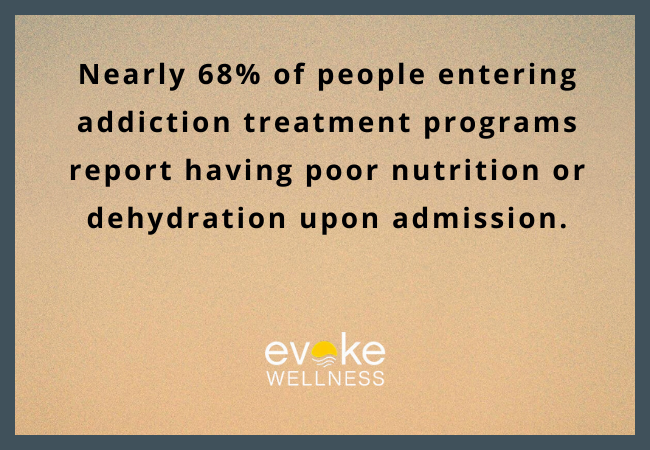Recovery from substance use disorders begins with detox, a critical phase where the body starts to rid itself of harmful substances and restore internal balance. While the clinical components of detox—such as medical supervision, medications, and monitoring—are essential, one often overlooked but vital aspect is nutrition and hydration.
During drug and alcohol detox, the body is under immense stress. Years of substance use often lead to malnutrition, dehydration, and imbalances in essential vitamins and minerals. These deficiencies can impair recovery, increase discomfort during withdrawal, and delay physical and emotional healing. At Evoke Wellness Detox Center in Massachusetts, nutritional and hydration support plays a central role in promoting holistic healing from the inside out.
Why Nutrition Matters During Detox
Substance use disrupts the body’s ability to absorb and utilize nutrients properly. It can lead to vitamin deficiencies, hormonal imbalances, and weakened immune function. During detox, the body’s energy demands increase as it works to stabilize systems affected by drugs or alcohol.
Proper nutrition helps:
-
Restore nutrient levels depleted during active substance use
-
Support organ function, especially the liver, which is responsible for metabolizing toxins
-
Stabilize mood and reduce anxiety or irritability
-
Improve energy levels and sleep quality
-
Strengthen the immune system
When clients begin drug and alcohol detox in Massachusetts, they are often dealing with chronic deficiencies in nutrients such as B-complex vitamins, magnesium, zinc, and amino acids—all essential for brain and nervous system function. A carefully planned nutritional approach helps correct these deficits, reducing the severity of withdrawal symptoms and supporting long-term recovery.
The Impact of Substance Use on the Body
Different substances have different effects on the body, but most disrupt appetite, digestion, and metabolic function. For instance:
-
Alcohol: Interferes with nutrient absorption and impairs liver function. Chronic alcohol use can cause deficiencies in thiamine (vitamin B1), leading to neurological issues.
-
Opioids: Often cause gastrointestinal problems, constipation, and reduced appetite.
-
Stimulants (such as cocaine and methamphetamine): Suppress appetite, leading to significant weight loss and malnutrition.
-
Marijuana: May increase appetite but doesn’t necessarily support balanced nutrition.
-
Benzodiazepines: Can slow digestion and interfere with the body’s processing of nutrients.
The long-term use of these substances depletes the body’s ability to repair and regulate itself. Nutritional therapy helps reverse some of this damage, laying the groundwork for physical restoration.
Common Nutritional Deficiencies in Detox Clients
Malnutrition is common in individuals entering detox. A few key deficiencies frequently seen include:
-
Vitamin B1 (Thiamine): Essential for nerve and brain function; often depleted in those with alcohol dependence.
-
Vitamin B6 and B12: Support brain health and help produce neurotransmitters like serotonin and dopamine.
-
Magnesium: Crucial for muscle function, sleep, and anxiety reduction.
-
Zinc: Important for immune response and cell repair.
-
Protein: Needed for tissue repair and immune health.
Addressing these deficiencies requires more than just a multivitamin. A full-spectrum nutritional plan with targeted foods and supplements is often necessary, particularly in medically supervised detox settings.
Hydration: A Critical but Overlooked Factor
Dehydration is another major concern during detox. Substances like alcohol and stimulants can cause significant fluid loss. Additionally, withdrawal symptoms such as vomiting, sweating, diarrhea, and fever can further dehydrate the body.
Proper hydration helps:
-
Regulate body temperature
-
Flush out toxins more effectively
-
Support kidney and liver function
-
Reduce headaches, fatigue, and dizziness
-
Prevent complications from withdrawal
In a clinical detox setting, clients are routinely monitored for fluid levels. They may receive electrolyte-rich beverages, intravenous fluids, or hydration therapy as needed. Hydration is one of the simplest yet most effective ways to ease the discomfort of detox and protect vital organs.
How Nutritional Support is Integrated at Evoke Wellness
At Evoke Wellness in Cohasset, our detox program doesn’t stop at managing withdrawal symptoms. We offer nutritional and hydration support as a core component of our holistic care model. Upon admission, each client receives a medical and nutritional assessment that evaluates their dietary habits, current health status, and any specific deficiencies.
Our approach includes:
-
Balanced meals crafted by experienced culinary staff, focusing on whole foods, lean proteins, complex carbohydrates, and healthy fats.
-
Vitamin and mineral supplementation tailored to each client’s needs.
-
Hydration monitoring, including access to electrolyte drinks and IV fluids when needed.
-
Education and counseling on how nutrition supports recovery and mental health.
Clients are also introduced to healthy eating habits that will support them beyond detox. Learning how to plan meals, stay hydrated, and make better food choices is part of the foundation for a sustainable recovery.
Nutrition and Mental Health During Detox
There is a direct connection between nutrition and mental health—especially during early recovery when mood swings, anxiety, and depression are common. Nutrients such as omega-3 fatty acids, B-vitamins, and magnesium play a key role in brain chemistry.
For clients with co-occurring mental health disorders, nutritional therapy can be especially helpful. At Evoke Wellness, dietary support complements therapy and medication management to help stabilize mood and reduce cravings. This integrated approach is part of what makes our drug and alcohol rehab in Massachusetts so effective and client-centered.
The Role of Gut Health in Recovery
Emerging research shows that gut health is closely linked to brain health. The gut-brain axis means that the condition of your digestive system can influence your mood, anxiety levels, and even cognitive clarity.
Substance use can disrupt the gut microbiome, the delicate ecosystem of bacteria in the digestive tract. Poor gut health can contribute to inflammation, poor immunity, and even depression.
We address this by:
-
Including probiotic-rich foods like yogurt and fermented vegetables in meals
-
Offering fiber-rich meals to support digestion
-
Reducing inflammatory foods such as processed sugars and refined carbs
-
Supplementing with digestive enzymes or probiotics when needed
This focus on gut health helps clients feel better faster and supports emotional balance during detox.
Recovery Nutrition Beyond Detox
The benefits of proper nutrition and hydration extend well past the detox phase. As clients transition into residential or outpatient treatment, maintaining balanced eating and fluid intake continues to play a vital role in mood regulation, energy, and relapse prevention.
We encourage all clients to continue nutritional counseling, meal planning, and self-care routines that began in detox. Recovery is a marathon, not a sprint—and sustained health begins with daily practices rooted in nourishment.
Integrating Wellness into the Detox Process
At Evoke Wellness in Massachusetts, we view detox as a time for healing, education, and empowerment. By integrating nutritional care, we help clients reconnect with their physical well-being and develop the habits that support lifelong sobriety.
Whether you’re entering our alcohol detox program in Cohasset, MA or seeking help for another substance use disorder, you can expect a comprehensive, whole-person approach. We treat the individual, not just the addiction—body, mind, and spirit.
Why Choose Evoke Wellness for Detox and Nutritional Support?
Evoke Wellness offers a medical detox experience that incorporates clinical excellence with compassionate, person-centered care. Our state-of-the-art facility, experienced staff, and commitment to wellness ensure every client gets the support they need to begin healing fully.
We are proud to be a leader in drug and alcohol detox in Massachusetts, with services that go beyond symptom management to include holistic support like nutritional therapy, hydration care, and mental health counseling. Our team is here to support you from the moment you enter detox through every step of your recovery journey.
Conclusion
Detox is more than just clearing substances from the body—it’s the first opportunity to begin true physical and emotional healing. Nutrition and hydration play a foundational role in this process, helping to repair the damage caused by substance use and laying the groundwork for lasting recovery.
At Evoke Wellness, we understand the critical importance of nourishing the body during detox. Our integrated care model ensures you receive medical support alongside the nutritional guidance you need to thrive. If you or a loved one is ready to take the first step toward healing, call us today at 866.931.6429 to learn more about our comprehensive detox and wellness programs.
FAQ on Nutrition and Hydration in Drug and Alcohol Detox
Why is nutrition important during detox?
Substance abuse often leads to poor nutrition and nutrient deficiencies. During detox, your body is working hard to heal, and proper nutrition provides essential vitamins, minerals, and calories to support organ function, repair tissues, and stabilize energy levels. Balanced meals help reduce fatigue, improve mood, and strengthen your immune system during withdrawal.
How does dehydration affect the detox process?
Alcohol and many drugs act as diuretics, which can lead to dehydration. Dehydration during detox can worsen withdrawal symptoms like headaches, nausea, dizziness, and confusion. Staying properly hydrated supports kidney and liver function, helping the body flush out toxins more efficiently and maintain electrolyte balance.
What are the best foods to eat during detox?
During detox, nutrient-dense foods are best. Think:
-
Lean proteins (chicken, fish, legumes) to repair tissues.
-
Whole grains for stable energy.
-
Fruits and vegetables for vitamins, minerals, and fiber.
-
Healthy fats (avocado, nuts, olive oil) to support brain health. Easily digestible foods are recommended, especially in early detox when the digestive system may be sensitive.
Can proper hydration reduce withdrawal symptoms?
Yes. Hydration helps ease common withdrawal symptoms like headaches, muscle cramps, and fatigue. Water supports overall detoxification by aiding kidney function and preventing dangerous imbalances in electrolytes that can happen during intense withdrawal periods.
Are supplements used in detox?
Often, yes. Many detox programs use vitamin and mineral supplements to correct deficiencies caused by substance abuse. Common supplements include:
-
B-complex vitamins (especially B1/Thiamine, crucial in alcohol detox)
-
Magnesium for muscle relaxation and nervous system support
-
Electrolytes (potassium, sodium) to maintain balance These supplements are tailored to individual needs and overseen by medical staff.





